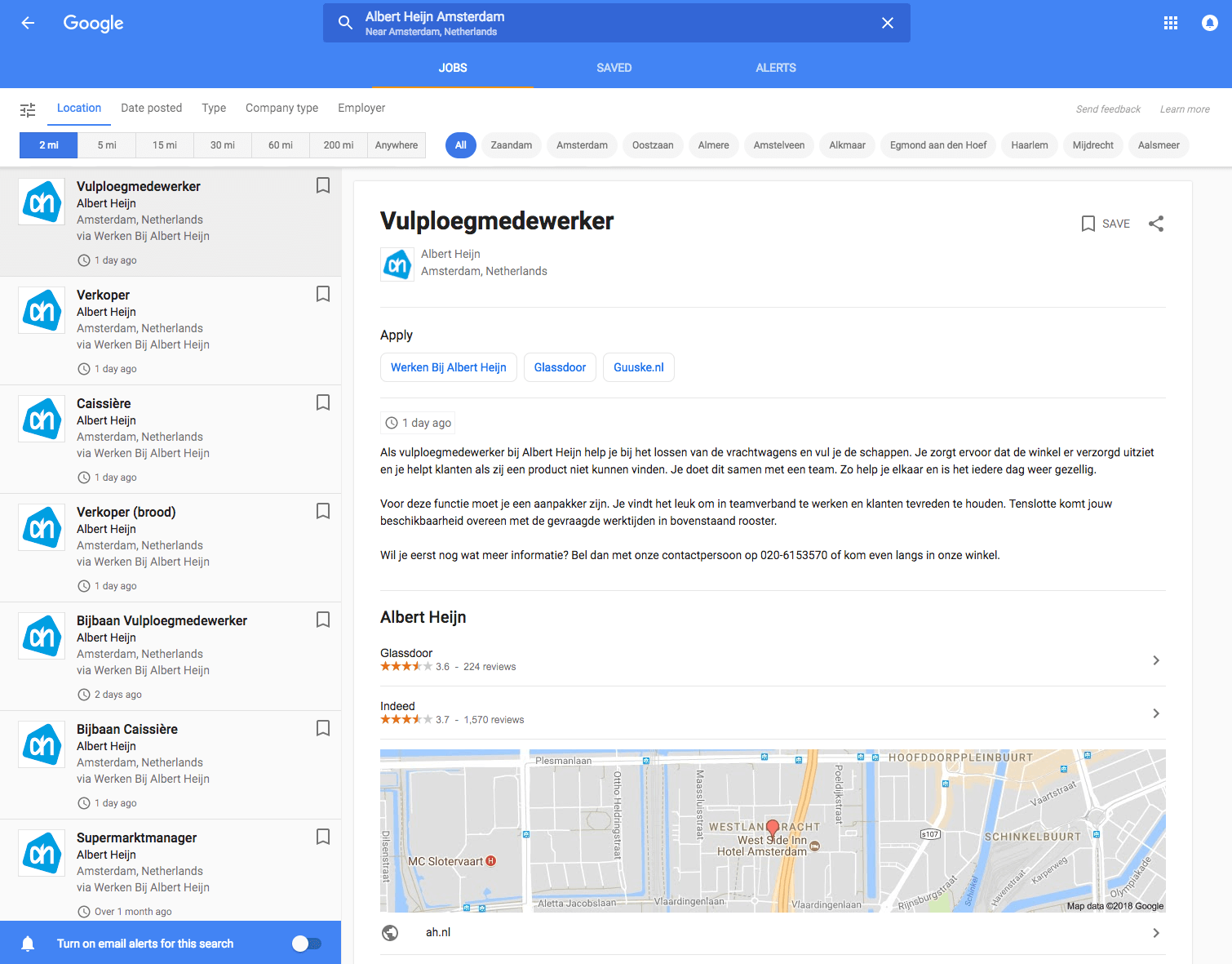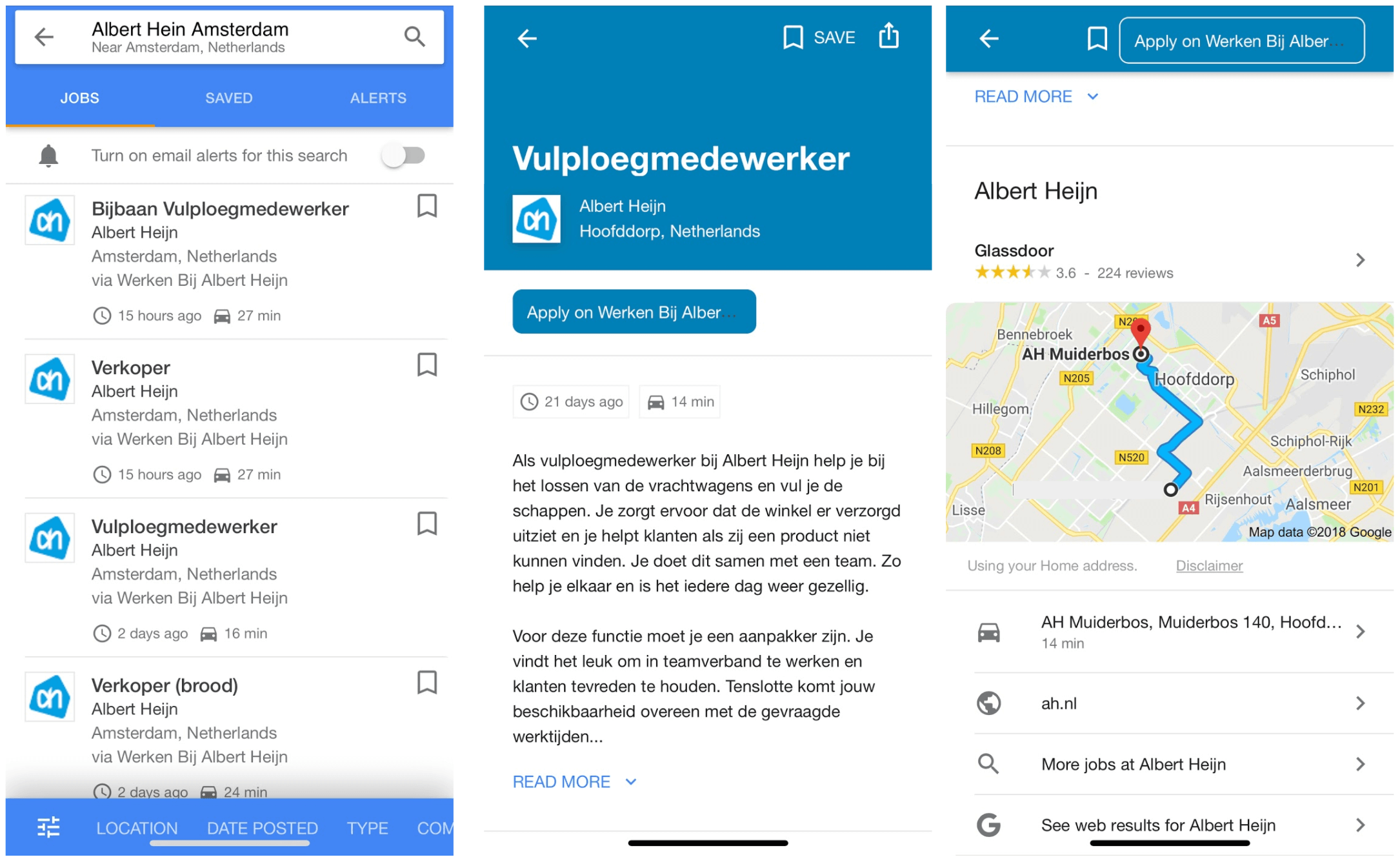

Developing and executing the perfect marketing strategy for your company is difficult. We are happy to give you a helping hand.

A close-knit group of people who breathe the Tilburg atmosphere and have the ambition to always go a step further.


Google for Jobs has been rolled out in the Netherlands. This is a recruitment initiative by Google. But what does this mean for recruiters like you?
Just as Google Flights is feared by online travel agencies and Amazon is shaking up Dutch Web retailers, Google for Jobs has the potential to shake up the recruitment market. Smart recruiters can profit handsomely.
In 2017, Google began displaying job postings in a window above regular search results in the U.S.. This selection of the three -according to Google- most relevant results was to help job seekers find the jobs that are currently open, rather than general job pages on job boards, which require additional click-throughs.
It aligns with Google’s goal of being able to answer questions directly, without site intervention. In this context, we have long seen the weather forecast in search results, a map of nearby providers and snippets that provide immediate answers to a question without having to click through.
Little by little, Google for Jobs is also expanding to other countries. Some Dutch recruiters, who were allowed to participate in the test period, tipped off that the snippet would also become available in the Netherlands in 2020.
Those currently searching for a job often still see “regular” search results, with sites such as Indeed, Monsterboard and the Nationale Vacaturebank well represented in the top 10. When Google for Jobs is completely rolled out, every job seeker will see a Google widget above those search results.

The image above illustrates this well: Google displays the top 3 job listings for the search. In doing so, Google often takes jobs from recruitment sites or from a partner such as Linkedin or Glassdoor.
Below those first three results is a button that unlocks even more relevant jobs on a new page. There are also a number of filters that allow the job seeker to tailor the search results to his or her needs: think location, required work experience and employer.

Now you may be wondering what impact this will have on you as recruiters. This new feature is in fact a clearer indexing than the indexing we are used to from Google for “normal” searches. This means it is not necessarily designed to sideline job boards. What you do want to make sure is that your site can be read by Google for Jobs, otherwise you run the risk that job seekers will never see your jobs.
Compare it to Google Flights. A search on “Amsterdam Miami” will immediately return relevant flights, times and prices. Many times faster than scouring all airline websites individually. The job snippet is eventually going to work similarly. The user benefits.
For job boards, Google for Jobs creates more work because they can no longer copy job listings on a one-to-one basis. When job boards do, Google for Jobs automatically prefers the site of the organization where the job is open.
For corporate recruiters, it’s an interesting development. With proper optimization, both technical and textual, they stand a better chance of coming face to face with job seekers.
To optimize your job site for Google for Jobs, it should provide enough information about the jobs. For intermediaries, this is annoying because Google for Jobs asks for details they would rather not reveal. This actually presents an opportunity for corporate recruiters , as they can start competing directly with pricey job boards on those.
Specifically, Google for Jobs looks for 11 details that it can then index.
To format this structured data in the desired way for Google to read it requires digging into the code. You also need an indexing API to quickly notify Google of new job postings. Your Internet agency will help you do this.
In addition, it is important to write good job postings. For example, you want to make the job title as clear and as standard as possible, paying attention to what candidates type into Google. Google Keyword Planner and Google Trends can give you inspiration for that.
That Google for Jobs is going to change the online recruitment landscape is almost certain. This has already been proven in other countries. Job sites that currently rank well will lose their high rankings if they do not take action. And at the same time, this new platform offers great opportunities for corporate recruiters, for example, who were generally beaten by the “big boys.
Since Google for Jobs is already being introduced in the Netherlands, now is the time to optimize your site. This will prevent you from falling behind. In times of crisis, when vacancy stops are the order of the day, this is one of the jobs you are more likely to have time for. But chances are you can’t do it alone.
As you saw above, optimizing for Google for Jobs is partly a technical story. 2manydots can help you with this technical part so you can focus on the day-to-day recruitment tasks, including writing those powerful job ads.